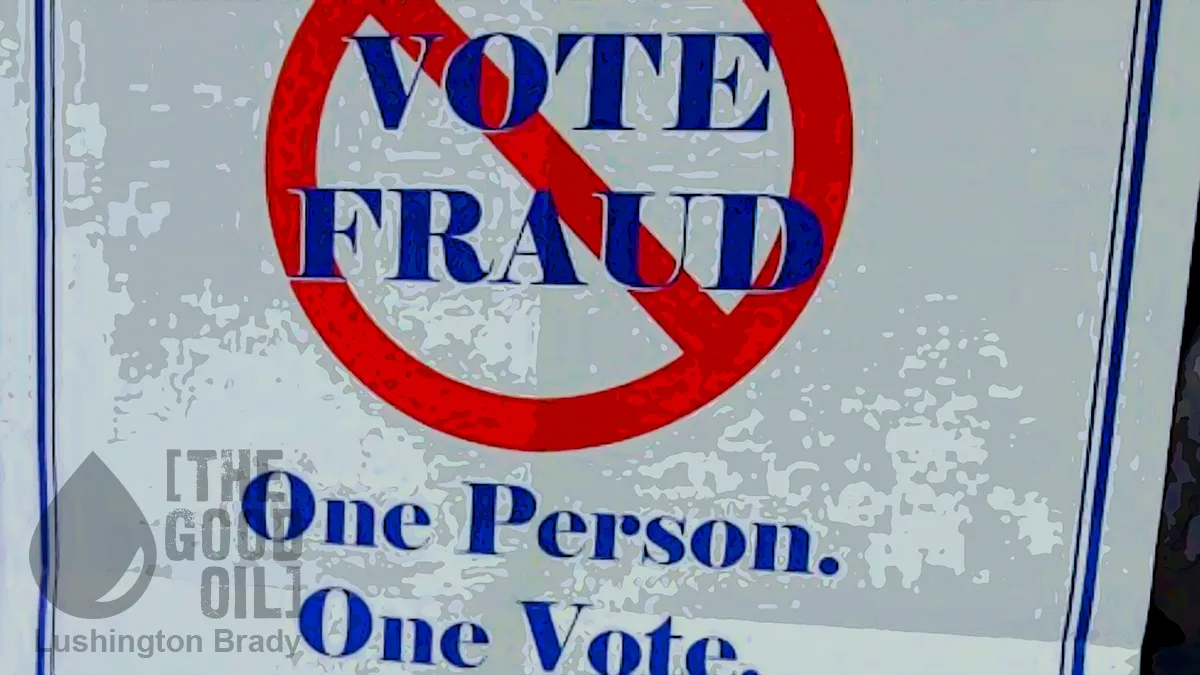Table of Contents
Whether or not you believe the 2020 election was stolen, it’s beyond obvious that the USA voting system is a broken dog’s breakfast wide open for abuse.
As an Australian, where voting is a well-regulated and orderly process, with little abuse, everything about the American system is confounding. The fact that presidential elections are held on a weekday, due to archaic concerns about 18th century farmers travelling by horse and cart, for instance.
The obsession with voting machines is another. For all that pencil and paper may seem old-school, it also leaves an indelible paper trail that electronic voting does not. As villain Raoul Silva (Javier Bardem) says, in Skyfall, computer systems are uniquely vulnerable by their very nature: Destabilize a multinational by manipulating stocks. Bip. Easy. Interrupt transmissions from a spy satellite over Kabul... done. Hmm. Rig an election in Uganda. All to the highest bidder… just point and click.
But far worse is the Byzantine mire of procedures set by individual states rather than a central, independent body (yes, yes, I know – federalism, yada yada). It’s beyond obvious that such a labyrinthine system is wide open to ‘legal but unfair’ gaming the system.
While there are dozens of ongoing election integrity issues, a newly released report from a watchdog group lists the top 50 election threats that the US is facing with less than three weeks until the presidential election.
The individual threats are group under five broad categories: ‘dark money’, ‘lawfare’, ‘get out the vote operations’, ‘vote fraud’, and ‘election fraud’.
The “dark money” category includes President Biden’s March 2021 Executive Order 14019, often referred to by critics as “Bidenbucks.” The term alludes to “Zuckerbucks,” the approximately $400 million coming from Facebook founder Mark Zuckerberg and widely alleged to have been funneled through left-leaning nonprofits to turn out the Democratic vote in the 2020 presidential election.
‘Bidenbucks’ works by effectively obscuring the money trail, with NGOs able to hide behind a fog of non-disclosure. Unsurprisingly, the Biden DoJ held a special session with NGOs on how to implement the scheme – all were left-wing. Multiple lawsuits are challenging the legality of the order, but by then election day will have come and gone.
It was Barack Obama who ramped up lawfare as an election tactic, instructing arms of the state such as the IRS to hound his political opponents. In the past two years, though, lawfare against Donald Trump by rogue prosecutors has gone nuclear.
“Special Prosecutor Jack Smith, New York Attorney General Letitia James, Manhattan District Attorney Alvin Bragg, Fulton County District Attorney Fani Willis have all brought various legal actions against a leading candidate for president, using what some have described as novel and, at times, tortured legal theories,” according to the GAI report.
GOP presidential nominee Donald Trump has thus far largely fended off his many legal woes, delaying proceedings and bogging down cases in the appellate process. Though the prospect of additional convictions prior to the election remain dim, Trump now faces attempts to revive some of his criminal prosecutions and barriers to his own efforts to delay proceedings further.
Who could possibly object, though, to ‘get out the vote operations’? Well, anyone who’s noticed that they’re being used to manipulate voter rolls.
Under the National Voter Registration Act of 1993, states are required to maintain their voter rolls. However, some states appear to clean them more regularly than others.
While states like Ohio, Texas and Oklahoma have cleaned millions of ineligible (mostly due to being dead) voters from their rolls, key battleground (and Democrat, surprise, surprise!) states are not nearly so diligent. Worse, with such states now handing out driver’s licenses to non-citizens, including illegal immigrants, states like key battleground Pennsylvania have over 100,000 voter registration records matched to non-citizen driver’s licences.
As states have examined their voter rolls, they have found non-citizens registered as voters.
While non-citizens are prohibited from voting in federal, state, and most local elections, municipalities in California, Maryland, and Vermont, and Washington, DC, allow non-citizens to vote in local elections.
“States across the country including Ohio, Minnesota, Nevada, and Texas have recently audited their voter rolls and found more than two million ineligible voters—including nearly 30,000 non-citizens in just five states,” according to the GAI report.
Arizona, also a key swing state, was found to have an astounding 218,000 voters who were incorrectly registered in the state as providing proof of US citizenship. That number had increased by 120,000 in just a month.
Even more astoundingly, they will be allowed to vote in November.
Another obvious candidate for abuse is automatic mail-in voting. In Australia, a voter has to apply for a mail-in ballot, and it has to be identity-checked and witnessed. Many US states used Covid as an excuse to make mail-in voting the first resort. The opportunities for abuse are obvious.
“Ballots can be lost in the mail or manipulated, and a secure chain of custody is impossible to guarantee. Twenty percent of poll respondents who voted by mail admitted to committing at least one kind of fraud. These are very difficult to verify, even when you require matching signature verification. Ballots can arrive late and raise difficult questions about when vote counting will conclude.”
In 2005, the bipartisan Commission on Federal Election Reform – which included ex-President Jimmy Carter and former Secretary of State under President George H W Bush, James Baker – highlighted the issues that concerned them about absentee ballots […]
“While vote by mail appears to increase turnout for local elections, there is no evidence that it significantly expands participation in federal elections,” the commission wrote. “Moreover, it raises concerns about privacy, as citizens voting at home may come under pressure to vote for certain candidates, and it increases the risk of fraud.”
What is often (deliberately) overlooked by either side of the debate over the 2020 election is that the idea that a massive, nation-wide, pervasive fraud took place – or was necessary. In fact, all that was needed was relatively low-scale fraud involving thousands, even hundreds, of ballots in a few key counting stations.
Whatever you believe about 2020, it’s beyond doubt that the voting system in the US needs a massive overhaul.








